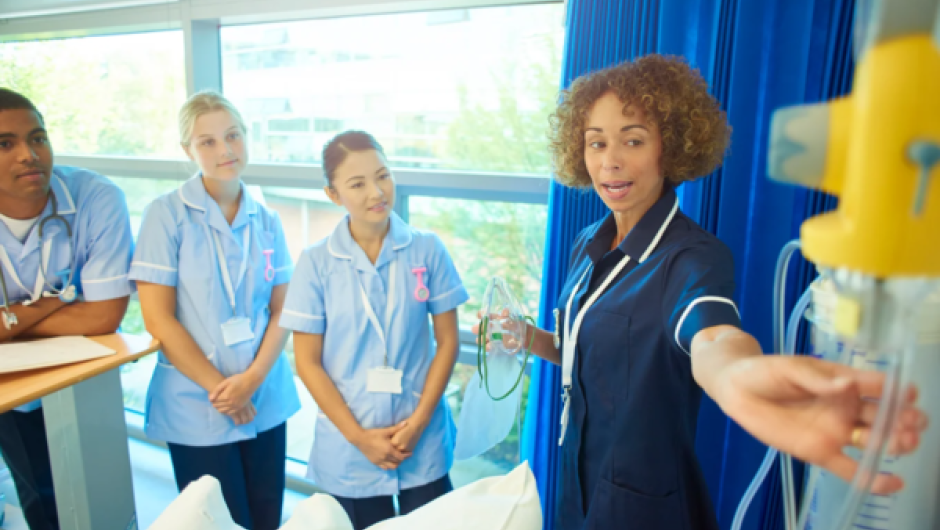Studying health gives you a holistic understanding of the factors that contribute to individual and societal wellbeing. It covers areas such as public health, nutrition, epidemiology, and healthcare management. It looks at topics from disease prevention to health policy, giving insights into the social, environmental, and behavioural influences on health.
Studying health opens up many career paths. Graduates or apprentices might find themselves in roles such as public health specialists, healthcare administrators, wellness coordinators, or health educators. There are also exciting newer careers like digital health, offering opportunities in health informatics and technology-driven solutions.
The impact you could make
- Help shape regulations that impact public health.
- Contribute to disease prevention in communities.
- Tackle health and wellbeing inequalities in the local area where you practise.
What you could study
- Communication in healthcare
- Health care practice
- Wellness in body and mind
- Holistic care
- Wellness in society

Discover careers in the NHS
The NHS offers a variety of careers in the health sector. Discover roles in the NHS and the different ways to get started on your future career.
Find out more
Chat to a current health student
Chat to a current health student using UniBuddy.
Some conversation starters for you:
- Ask which modules they really enjoyed.
- Find out how easy it was for them to make friends on their course.
- Do they have any tips on your personal statement?
- Did they do anything to prep for uni before they went?
- Are there books, podcasts or YouTube channels they would recommend?
Example module
Example assignment
Subjects it's useful to have studied first
Some health courses or apprenticeships will have requirements for previous qualifications in certain subjects. Entry requirements vary, so always check with the provider.English
Psychology
Health and social care
Sociology
Biology
Chemistry
Hard skills you'll develop
- Plan, implement, and evaluate health programs
- Analyse health data and using digital tools
- Understand patterns of disease and risk factors on public health
Soft skills you'll develop
- Strong team working ability
- Problem-solving
- Cultural competence
Careers: Where it can take you
Find out more about your career prospects from studying health. The following information is based on a typical health professional role.Available jobs
Average salary
Career options
Health, social, and childcare services
Public services
Medicine, dentistry, and nursing
Support and operational staff

What is a… workplace health consultant?
Being a workplace health consultant, you use your expertise to create healthier and more balanced work environments. You collaborate with organisations to develop wellness programs, promote healthy habits among employees, and enhance overall workplace wellbeing. Whether it's designing simple workspaces, organising stress management workshops, or implementing fitness initiatives, you play a key role in creating a healthier and happier workforce.
Find your ideal career
Take our careers quiz to find your ideal job matched to your personality type.Getting in: Entry requirements
Find out more about what you'll need to study health at university or as an apprenticeship.
Average requirements for undergraduate degrees
Entry requirements differ between university and course, but this should give you a guide to what is usually expected from health applicants.
A levels
Scottish highers
Vocational

Health and science apprenticeships
Check out our industry guide to help you decide if a health and science apprenticeship might be the right choice for you.Other subjects you may be interested in
Considering an apprenticeship?
Applying for an apprenticeship is just like applying for a normal job. Here’s what you need to know:-
1
Deadline
Apprenticeships don't follow the same deadlines as applying to uni, the deadline is down to the employer. -
2
Where to apply
You apply directly through the employer. -
3
No limits
You're not restricted to one apprenticeship application; you can do as many as you like. -
4
Apply to university and apprenticeships
There's nothing stopping you applying to university through UCAS, while also applying for apprenticeship vacancies. -
5
Find out more

Apprenticeship vacancies
Check out live apprenticeship vacancies in health.Explore further
Go deeper into topics around health with the following:-
1
The Health Foundation podcast
A series looking at the most important issues affecting the future of health and care for people in the UK. -
2
Radio 4 – Inside Health
Series that demystifies health issues, bringing clarity to conflicting advice. -
3
The Sunday Times Bestseller – Just One Thing
Read the book that brings to life Dr Mosley's mission to find things you can introduce into your daily routine to have a big impact on your mental and physical health.
Application advice
Whether it's personal statement tips or what to write in a cover letter for an apprenticeship application, our application advice will help you get ahead in your health journey.Skills, experiences, and interests to mention
- Have you always been fascinated by our bodies and what keeps us healthy?
- Are you a passionate advocate of our NHS?
- Perhaps a personal health experience has inspired your interest to become an expert on the topic of health.
- Can you demonstrate that you’re good working in team environments?
- What have you previously studied that required critical thinking and evaluation of complex information?
- What extracurricular activities do you take part in that prove your communication skills?

Personal statement guide
We asked admissions tutors to share their dos and don’ts for writing a strong and engaging health personal statement. Here's what they told us.









